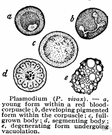plas·mo·di·um
(plăz-mō′dē-əm)n. pl. plas·mo·di·a (-dē-ə)
1. A multinucleate, often large mass of protoplasm that moves and ingests food and is characteristic of the vegetative phase of plasmodial slime molds.
2. Any of various protozoans of the genus Plasmodium, which includes the parasites that cause malaria.
plas·mo′di·al (-dē-əl) adj.
American Heritage® Dictionary of the English Language, Fifth Edition. Copyright © 2016 by Houghton Mifflin Harcourt Publishing Company. Published by Houghton Mifflin Harcourt Publishing Company. All rights reserved.
plasmodium
(plæzˈməʊdɪəm)n, pl -dia (-dɪə)
1. (Biology) an amoeboid mass of protoplasm, containing many nuclei: a stage in the life cycle of certain organisms, esp the nonreproductive stage of the slime moulds
2. (Animals) any parasitic sporozoan protozoan of the genus Plasmodium, such as P. falciparum and P. vivax, which cause malaria
[C19: New Latin; see plasma, -ode1]
plasˈmodial adj
Collins English Dictionary – Complete and Unabridged, 12th Edition 2014 © HarperCollins Publishers 1991, 1994, 1998, 2000, 2003, 2006, 2007, 2009, 2011, 2014
plas•mo•di•um
(plæzˈmoʊ di əm)n., pl. -di•a (-di ə)
1. an ameboid, multinucleate mass or sheet of cytoplasm characteristic of some stages of organisms, as of slime molds.
2. any parasitic protozoan of the genus Plasmodium, causing malaria in humans.
plas•mo′di•al, adj.
Random House Kernerman Webster's College Dictionary, © 2010 K Dictionaries Ltd. Copyright 2005, 1997, 1991 by Random House, Inc. All rights reserved.
plas·mo·di·um
(plăz-mō′dē-əm) Plural plasmodia
1. A mass of protoplasm having many cell nuclei but not divided into separate cells. It is formed by the combination of many amoeba-like cells and is characteristic of the active, feeding phase of certain slime molds.
2. Any of various single-celled organisms (called protozoans) that exist as parasites in vertebrate animals, one of which causes malaria.
The American Heritage® Student Science Dictionary, Second Edition. Copyright © 2014 by Houghton Mifflin Harcourt Publishing Company. Published by Houghton Mifflin Harcourt Publishing Company. All rights reserved.
ThesaurusAntonymsRelated WordsSynonymsLegend:
| Noun | 1. |  plasmodium - multinucleate sheet of cytoplasm characteristic of some stages of such organisms as slime molds plasmodium - multinucleate sheet of cytoplasm characteristic of some stages of such organisms as slime molds |
| 2. |  plasmodium - parasitic protozoan of the genus Plasmodium that causes malaria in humans plasmodium - parasitic protozoan of the genus Plasmodium that causes malaria in humanssporozoan - parasitic spore-forming protozoan genus Plasmodium - type genus of the family Plasmodiidae |
Based on WordNet 3.0, Farlex clipart collection. © 2003-2012 Princeton University, Farlex Inc.